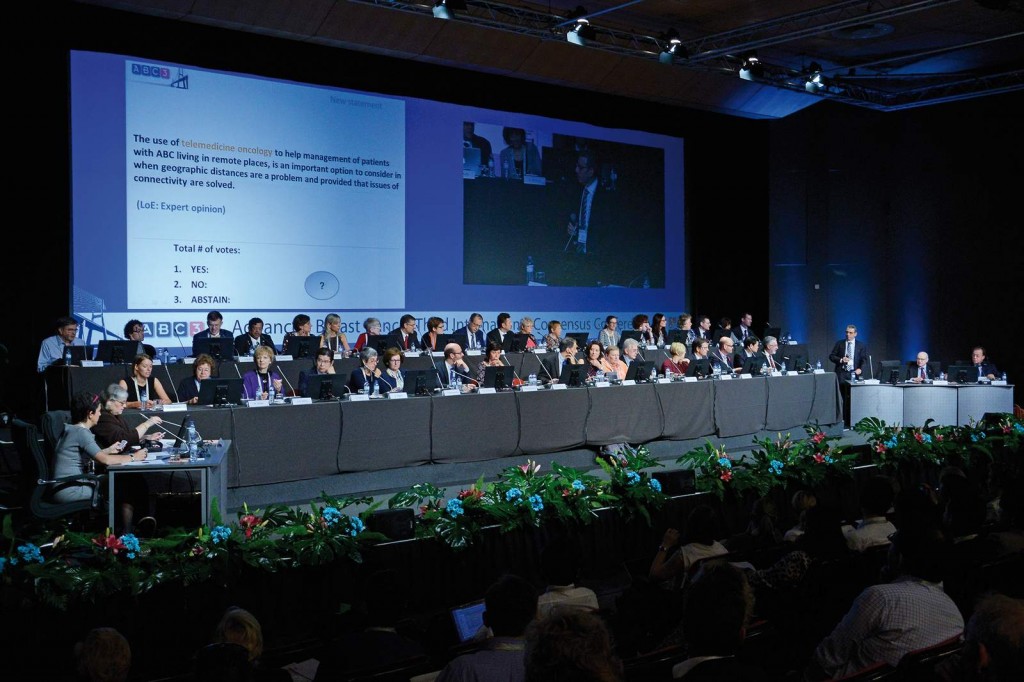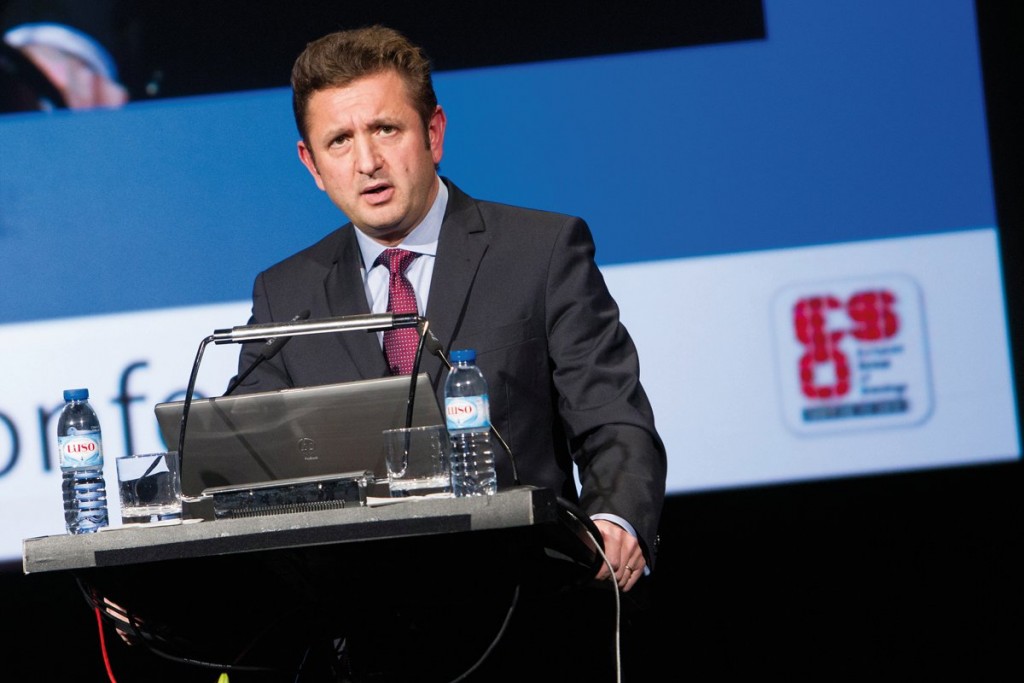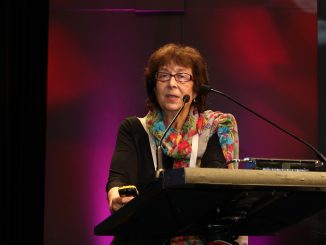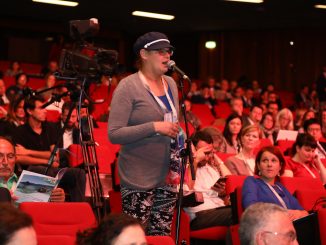
Every two years the metastatic breast cancer community convenes to assess what needs to be done to bridge gaps – gaps in scientific/clinical knowledge and in service provision, and gaps between the patients and professional communities.
More than one in four people say they would prefer it if people with advanced breast cancer kept it to themselves and did not talk about their condition to anyone but their doctor. This was one of the findings of the Global Status of Metastatic Breast Cancer Decade Report 2005–2015, and it helps explain many of the report’s other key findings: namely, that far too many people living with advanced breast cancer are still not getting the information and support they need.
That’s not to say that nothing has improved over the 10-year period covered by the report. It has, and nowhere is this more evident than at the ABC (Advanced Breast Cancer) conference, where clinicians, patient advocates, researchers and support professionals from across the world gather in Lisbon every two years to identify key issues, and build a consensus on what needs to be done and the political will to make it happen.
Over the past four years the conference has set out a stall on the world stage to establish international guidelines for the treatment and care of women, and some men, with advanced disease, and has added substantially to these recommendations at each conference.
This is no small achievement given that, until quite recently, some oncologists were arguing that such guidelines were not possible, because metastatic breast cancer is too complex and individual. That objection now seems to have been overcome. The ABC consensus panel includes the world’s top breast cancer specialists, and since ABC2, the consensus guidelines have been published jointly by ESO (the European School of Oncology, which organises the conference), together with ESMO (the European Society for Medical Onco-logy) – the support from ESMO also demonstrating the ‘buy in’ to the process.
The rise of a vocal, if still fragmented, patient advocacy movement for survivors of metastatic breast cancer, particularly in the US, is also well-reflected at the ABC conference. While patient advocates are now involved at some level in almost all the international breast cancer conferences, including San Antonio, the European Breast Cancer Conference (EBCC) and the St Gallen consensus meeting on early stage breast cancer, ABC is unusual in the extent to which patients and support specialists are integrated into the programme on the main stage; patient advocates also participate as equals in the consensus panel.
Also well represented are specialists other than medical oncologists, whose involvement within multiprofessional teams is key to meeting the full range of care and support that people living with metastatic breast cancer need to sustain a good quality of life.
So it was fitting that the third ABC conference, which took place last November, should be the platform chosen by Pfizer to launch their comprehensive Global Status of Metastatic Breast Cancer report into the unmet needs of people with metastatic breast cancer, and how perceptions and realities – clinical, scientific, policy and advocacy – have changed over the past decade.

In her now customary opening address, co-chair Fatima Cardoso, the medical oncologist who has led the development of ABC, reminded the audience that efforts to achieve this level of focus on metastatic breast cancer only started around ten years ago, and were built on surveys that highlighted how forgotten and isolated patients with metastatic disease have been.
She paid tribute to Novartis and Pfizer as the major supporters of researching unmet needs at global and European levels, a counter to the criticism often levelled at the pharmaceutical industry, and its focus on early stage disease. And she warmly welcomed the Global Status report, which was published in partnership with ESO and ABC, and is the most comprehensive report to be published in this field so far. It is based on evidence drawn from multiple sources, including substantial surveys of patients and the public conducted across 34 countries.
 The strapline of the ABC conference is ‘Bridging the Gap’ and Cardoso highlighted a number of priorities that need to be addressed in order to meet the needs documented so clearly in the Global Status report – and to improve patient satisfaction with their oncologists.
The strapline of the ABC conference is ‘Bridging the Gap’ and Cardoso highlighted a number of priorities that need to be addressed in order to meet the needs documented so clearly in the Global Status report – and to improve patient satisfaction with their oncologists.
Key among these, she argued, is communications training for healthcare professionals (one in two doctors who responded to the survey had been given no such training), and greater involvement of patients in decisions regarding their care (fewer than half of the patients surveyed reported being involved in decision making).
She highlighted in particular the importance of talking to patients about end-of-life and supportive and palliative care: “Our ABC recommendation is for it to start early, but in 65% of cases it happens very late, when it’s difficult to have these discussions,” said Cardoso.
CJ (Dian) Corneliussen-James, co-founder and president of the US advocacy group METAvivor, brought a patient perspective to this topic, describing how many doctors are still failing to communicate bad news promptly, and their patients consequently do not fully understand the implications of being diagnosed with metastatic disease. She also questioned the emphasis on messages about healthy living, from both doctors and parts of the advocacy movement, which she says results in some women blaming themselves for their disease, and contributes to the prejudice they face.
A particular concern for everyone in the advanced breast cancer community is the slowing pace of progress in survival rates. Cardoso spelt out the worrying reality that, despite the field having pioneered new treatments, such as trastuzumab (Herceptin) – the first targeted agent for treating solid tumours – innovation in breast cancer is now lagging behind other tumour types such as lung cancer and melanoma.
This is reflected in survival rates, which remain poor, with only one in four people diagnosed with advanced breast cancer surviving for five years or more. With global rates of breast cancer rising fast, this means that the current number of deaths – around 500,000 in 2015 – will rise to 800,000 by 2030, said Cardoso.
The Expert Eye
Last year, the European Parliament explicitly extended to patients with metastatic disease its 2003 call for all breast cancer patients to have the right to be treated by a multidisciplinary team of experts at a specialist centre (2002/2279(INI)). In practice, many member states are still a long way from complying with this policy, despite a deadline set for this year.
A manifesto setting out the imperative for specialist breast units will be presented at the European Breast Cancer Conference (EBCC) in Amsterdam this March. Even in countries where the principle of specialist centres has been embraced, some patients with metastatic disease are still being treated exclusively by medical oncologists, without input from other specialists. The lack of agreed training or accreditation for ‘breast cancer specialists’ is also a concern.
“The Expert Eye’ (left), painted by Shirley Bianca, a two-time breast cancer survivor, is part of a campaign to regulate and provide a Global License in Specialised Breast Cancer Surgery, which was presented at ABC3. A collection of Bianca’s paintings, titled Message of Hope, can be found on YouTube.”
What’s new?
The conference took a close look at the latest scientific advances in treating advanced breast cancer. The headline news is most positive for HER+ disease, where progress is continuing thanks to treatments such as the ‘dual blockade’ of trastuzumab and pertuzumab (Perjeta), and T-DM1 (Kadcyla). A number of inhibitors are in trials for use in ER+ disease, with one drug palbociclib, (Ibrance), which inhibits certain enzymes implicated in tumour growth, already approved in the US. Like many such drugs, however, there is still no biomarker to show who will benefit most. The least encouraging headlines are for triple negative disease, which still has no targeted therapy, only chemotherapy.
New therapies bring with them new side-effects. The conference heard about some of these from Lesley Fallowfield, of Sussex Health Outcomes Research and Education in Cancer, (UK), who also spoke of the need to develop patient-reported outcome tools that can drive research into the best way to prevent or ameliorate them.
Survivorship issues, supportive and palliative care and affordability of drugs all had dedicated sessions, as did clinical dilemmas, such as whether and when to remove a primary tumour in patients with metastatic disease.
The implications for practice arising from these presentations will be reflected in new or modified statements in the ABC3 guidelines, as agreed by the concluding consensus panel session.
Among the most frustrating issues for oncologists, which will be covered in a new statement, is the lack of studies that define the optimal sequence of agents in different types of metastatic breast cancer. As Cardoso argues, trials should compare sequences of drugs in one order and then the reverse, but neither regulators nor companies accept this crossover trial design, because it decreases the chances of observing a positive outcome. “But what we need to know in the metastatic setting is the value of adding a new agent to what we already have, and to know how best to incoporate it,” says Cardoso. “We need the regulators on our side in this.”
There are also problems with early approval of drugs at phase II, such as with the new inhibitor, palbociclib, as results often fail to hold up at phase III, the stage at which drugs for early breast cancer are usually approved. “We want to make sure a drug is really useful and not just given because it’s a new drug,” says Cardoso.
A call to use objective tools, such as ESMO’s Magnitude of Clinical Benefit Scale or ASCO’s Value Framework, to evaluate such therapies, will therefore be issued in another new statement from the ABC consensus panel.
A new set of statements was also agreed on support for palliative care symptoms, such a fatigue, neutropenia and dyspnoea. The latter condition, breathlessness, is one of the hardest to control. As Matti Aapro, a geriatric oncology specialist at the Genolier clinic, Switzerland, told the conference, this is partly because it has so many possible causes in people with advanced cancer, and very few effective treatments exist.
An overview of the additions and modifications agreed to the ABC guidelines is published on p 59. The full consensus guidelines will be published in The Breast and Annals of Oncology.
One guideline for the globe?
The big question, of course, will be how to ‘bridge the gap’ between the published guidelines and the real world of clinical practice. Talking with oncologists at ABC3 it seems there is no substitute for ‘ambassadors’ to present the guidelines around the world.
There are also major challenges in how they can be applied in different settings. In Germany, for example, the country’s guidelines group has assessed the ABC consensus alongside its own and actually added to it, whereas in low-income countries there are aspects of care that are far from achievable.
No one knows this better than Alexandru Eniu, a medical oncologist in the breast unit at the Ion Chiricuta Cancer Institute in Cluj, Romania, who is involved in a survey of cancer drug availability in Europe and globally, run by ESMO together with the WHO and other organisations.
“It is striking to see that many countries, including my own, lack access to some cancer treatments on the WHO’s essential drugs list,” he says.

These aren’t the new targeted agents, which are also not available in many emerging countries, but some basic and cheap agents such as tamoxifen and 5FU, which Eniu says are simply not economical for companies to distribute in some markets. He is also of course an advocate for ESMO’s new Magnitude of Clinical Benefit Scale to show the value of new drugs.
He stresses, however, that addressing drug availability may be the easy bit. The key and ultimate aim throughout Europe and elsewhere must be establishing multidisciplinary specialist breast units, and this will involve complex issues that will vary according to the country. In Romania, he says that access to radiotherapy is the biggest concern – “It is estimated that only about 25–50% of Romanians have access, owing mainly to lack of equipment,” he says.
“In breast cancer, this means that surgeons will often propose a mastectomy because they can’t offer radiotherapy,” he adds, “and this can really impact the quality of life for patients.” Volume of surgery is also an issue, and Eniu is hopeful that a voluntary breast unit accreditation scheme, under development at EU level, will eventually improve matters.
“In my centre I am lucky to work with a large multidisciplinary board, but that just isn’t possible in other areas at present,” he says. “We have a grant from ASCO to set up an online board where outlying hospitals can send us a request to have cases discussed at our institute, although there are challenges in data privacy and timely management. But it is a step forward in bringing multidisciplinarity to smaller centres where they can’t build a breast team.”
Given that most people with metastatic breast cancer are being treated in health systems that are no more advanced – and often far more basic – than Romania’s, could the ABC guidelines be seen as so ambitious they become, in effect, irrelevant in most settings?
Cardoso believes this could be a danger, and she strongly advocates adopting ‘stratified guidelines’ that define the second best option, which will offer a good standard of care that could be deemed more immediately achievable, but will still enable advocates to argue with their governments that ‘second best’ is just not good enough.
A pioneering survivorship service
“I’ve felt that it’s not right to only start survivorship care after treatment ends, instead of at the point of diagnosis, where you can find out what a woman’s life goals are. It’s about finding out what brings joy in their lives.”
These are the words of Lillie Shockney, oncology nurse, two-time survivor of breast cancer, and head of the breast cancer service at the renowned Johns Hopkins Hospital in Baltimore, Maryland.They wanted someone who ‘walked the walk’ as well as talking the talk, she said, explaining how it was that someone from her background was seen as ideal to take charge of the service.
Under her leadership, the hospital has developed a pioneering survivorship programme that is capable of helping patients with a full spectrum of support needs, as well as integrating survivorship concerns into the treatment plan.
A case in point: a woman who didn’t enjoy her bank job much, but loved playing the piano – “I realised if I didn’t intervene before she saw the medical oncologist she could be given a drug that caused peripheral neuropathy, and that could be avoided.”Another example: patients can plan for coping with fatigue. The literature indicates that ‘power walks’ can reduce it by as much as 70%. Patient navigation – helping women through their journey with such information – is another way Shockney and her team can help.
Treatments can be planned around work, too, if that’s important. Johns Hopkins itself walks the walk here, with a programme, Managing Cancer at Work, in place for its own staff – of the more than 42,000 employees in the hospital and university, about 800 have been diagnosed with cancer.For patients with metastatic disease, Shockney has organised a retreat at Johns Hopkins, where women and their partners can spend a few days in peace and plan to fulfil life goals, even though they may not be there physically, such as by preparing cards for key moments in their children’s lives (she ran a video on the retreat in her conference presentation). “We have boxes of cards for all occasions – birthdays, bar mitzvahs, weddings,” she said. “I had a call recently from a 24-year-old woman who got married and whose mother died when she was ten, under our care. She thanked me for helping her mother to still be part of her life.”
Summary of consensus statements at ABC3
The consensus process works by amending existing statements from ABC1 and ABC2, where new evidence has emerged, and adding new ones. These then will be published along-side the unchanged statements later this year in The Breast and Annals of Oncology. Summaries of the new ABC3 statements are as follows (the full statements await final approval):
- The ABC community strongly calls for clinical trials addressing important unanswered clinical questions in this setting, and not just for regulatory purposes. Clinical trials should continue to be performed even after approval of a new treatment, to provide real world data on performance of the therapy.
- Use objective scales to evaluate benefits of new treatments, such as ESMO’s Magnitude of Clinical Benefit Scale and ASCO’s Value Framework.
- Use telemedicine to help manage patients in remote places.
- ‘Strong consideration’ should be given for using patient-reported outcome measures as a regular part of clinical practice – but they must be easy do, say with iPads.
- With survival improving for many patients, health professionals should consider survivorship issues, by being ready to adapt treatment strategies according to patients’ circumstances. Patients should have the opportunity to work, should they want to. Breast reconstruction should be an option for women with stable disease.
- In HER2+ disease, the optimal duration of treatment isn’t known, but stopping it after several years of remission may be considered for some patients. If pertuzumab is not given, first-line treatments can include trastuzumab combined with vinorelbine or a taxane, and in later lines trastuzumab can be given with several chemotherapy agents. Chemotherapies to combine with the dual blockade of trastuzumab and pertuzumab are paclitaxel or vinorelbine.
- The addition of palbociclib to an aromatase inhibitor at first line has shown benefit in postmenopausal patients, but phase III results are needed before recommendation. Palbociclib with fulvestrant beyond first line is an option, but overall survival results are awaited.
- In non-BRCA, triple negative disease, all chemotherapy recommendations as for HER2– disease apply, as there are no data or specific recommendations. Regardless of BRCA status, carboplatin is an important option for patients previously treated with anthracyclines with or without taxanes.
- In HER2– disease, anthracyclines can be reused under certain conditions.
- For BRCA-associated disease in patients with triple negative or luminal metastatic breast cancer, genetic counselling and possibly BRCA testing should be discussed with the patient if the results can impact treatment decisions and/or clinical trial entry.
- In HER2+ patients with brain metastases and stable extra-cranial disease, systemic therapy should not be changed. Where brain metastases are the only site of recurrence it is not known whether adding chemotherapy will alter the disease course and it is recommended that trastuzumab be restarted if stopped.
- Metronomic chemotherapy (low dose given very frequently, e.g. daily) is a reasonable option for patients who do not require a rapid response.
- Multigene panels, such as those obtained using next-generation sequencing, on evolving changes in metastatic tumours have not proved to be beneficial and should only be used in an investigational setting.
- In supportive and palliative care, there are new statements on managing cancer-related fatigue, neutropenia, non-infectious pneumonitis, mucositis/stomatitis, dyspnoea, nausea and vomiting, and mTor inhibitor endocrine toxicities.
- Two new definitions are on oligo-metastatic disease (low volume disease that could be treated to achieve remission) and patients who suffer from multiple chronic conditions.





